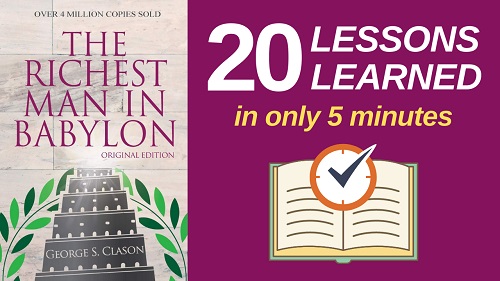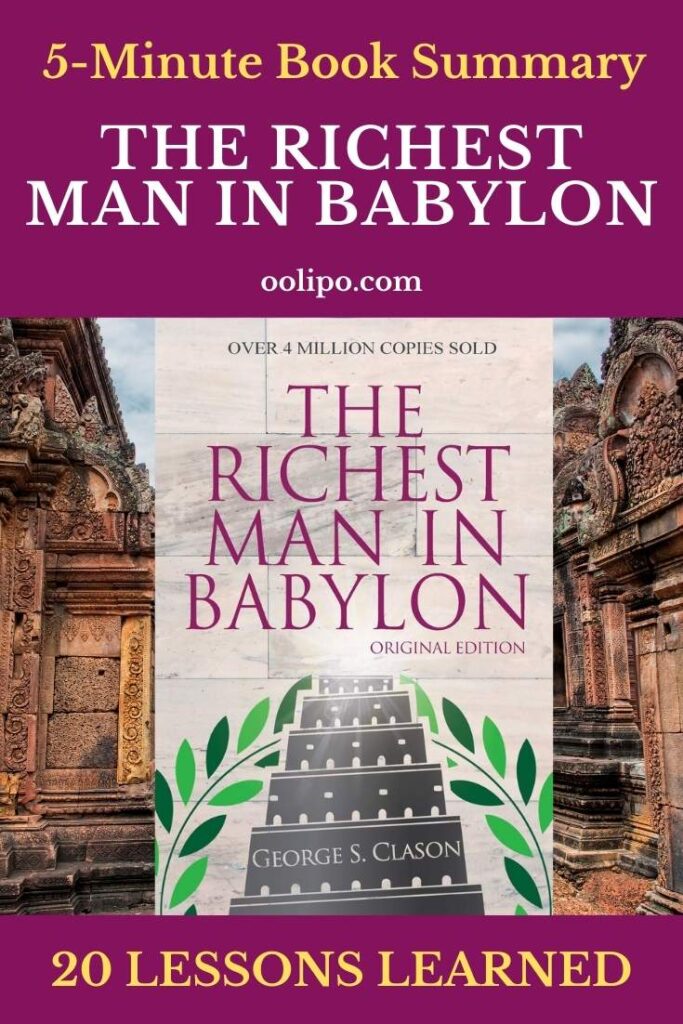The Richest Man in Babylon is a 1926 book written by George S. Clason. It remains one of the most popular and influential books on financial planning. The book reveals the strategies to acquiring money, making money, and securing your money. It is essentially a guide on how to attain wealth as well as insights on what to avoid when attempting to seek money. As mentioned in The Richest Man in Babylon Summary below, the advice given is simplistic and realistic so that anyone can secure their own wealth.

The Richest Man in Babylon Summary
Here are the 20 lessons to take from The Richest Man in Babylon:
#1 Start by feeding your pockets
The first lesson that the book mentions is the idea of spending money but still adding money to your purse. The example goes as follows: you put ten dollars every day in your purse, but you only ever spend nine dollars. One-tenth of your money should be saved, while the nine-tenths should be used to spend. Eventually, you will be accumulating more money as every day you are saving and one-tenth of your income.
#2 Control your expenditures
Clason claims that in order to really save money you need to differentiate the expenses that are necessary to your everyday life and others that you want to make possible and have them covered with the nine-tenths of your income that was mentioned earlier. Money should not be spent on other expenses that don’t fit within the nine-tenths budget.
#3 Make your money multiply
This is an essential lesson from the book that has always been floating around in the discourse of financial planning: invest your money. Essentially, Clason is encouraging you to take the money that is just sitting in your bank account and have it make money for you whether you are working or traveling. Looking into small investments that aren’t risky is beneficial, especially as those that have a compound interest will lead to more money.
#4 Protect your valuables from loss
This tip encourages you to think critically about your money, specifically your principal. Although other investments that can result in even bigger earnings are appealing, are they worth it if it means you lose your principal? Clason says no. Always make sure that you are making safe investments.
#5 Your residence is a form of investment
Clason argues that one of the best investments you can make is in the form of your residence. He claims that no family can truly be happy until they are in their own home which they own. He also makes the argument that owning a house is better than having a landlord, as eventually, you will be making payments towards your house and not just your lender, and that at least you will own your own home.
#6 Secure a future income
This concept revolves around the benefits of a retirement fund for when you are no longer young and able to work. The idea is that one should try to save the most they can while also having a possible investment in order to be able to support themselves and their family should it have to come to it.
#7 Increase your capacity to earn
This lesson encourages the idea of learning new methods to perfect your craft/profession so that you can become more profitable. Also learning new skills and learning, in general, are essential to increase one’s ability to earn more money.
#8 Money slips away if invested into something you’re unfamiliar with
This is described as a law of gold, in which it is a law that anyone who invests in a business which they are unfamiliar with, simply for the aims of making money, is guaranteed to lose that money. It is also noteworthy to state that Clason argues that if you do invest in a field you are unfamiliar with, you only prove yourself as inexperienced with wealth.
#9 Money slips away if involved with tricks or schemes
This law revolves around the idea that no money can come from someone who is following the advice of those who use tricks or schemes to make money. There is no fast way to increase your wealth, so be wary of any gimmicks that sell that at the forefront. It is best to be smart and not invest money in unfamiliar territories.
#10 If you have debts, allot money for it
So we already covered the one-tenth and nine-tenths rule. Clason now presents the one-tenth, two-tenths, and seven-tenths rule to pay off your debts. The one-tenth of your earning would remain with you to save. The nine-tenths that is used to spend on necessities and desires is now transformed into seven-tenths. The remaining two-tenths are now used to pay off your debts.
#11 If you lend money, only do so if it won’t be a burden
The novel covers the scenario of lending money to a friend. It warns that before you lend money to someone you trust, you have to ensure it will be a good investment on your part. If your friend will not be able to pay back the money then it is not a wise investment. Even if you believe that your friend will repay the loan, you must take into account if something were to happen, and they suddenly are unable to. If that money were never to return to you, guarantee that you wouldn’t suddenly face a financial burden.
#12 A man’s wealth is not how much money he carries
This book makes it very clear that a person’s wealth is not a determinant of how much money they have readily available to them, like in a wallet or bank account. It argues, rather, that a man’s wealth relies on their income. The income that a person has that continuously fills their pockets with money, is more important than the amount a person has in their bank account at a certain moment.
#13 It costs nothing to ask for help
This lesson is pretty self-explanatory, but it must be said. If you are struggling, either with money or financial literacy, it costs you nothing to ask someone you trust for help. If anything, not asking for help is what is preventing you from attaining the wealth you desire.
#14 To find wealth you must seek it
Although it seems simple, Clason makes it clear that in order to find wealth you must go out and find it. Money will never just come to you, that is unless you have already established a passive form of income. Clason argues that in order to make money you must go after it.
#15 Procrastination is the enemy
It is easy to desire wealth, everyone shares that desire. What is difficult is beating procrastination to achieve wealth. It might happen where an opportunity arises to make money, but because procrastination is within us all, it might prevent us from taking that opportunity.
#16 The laws of money are the same as the laws of gravity
Although it would seem that money and gravity don’t share a commonality, Clason argues otherwise. He finds the similarity between the two in that they are universal and unchanging. So what does that mean? It means that if these laws worked for the richest man in Babylon they will work for you and anyone in the future.
#17 Take advice from those in the field
Just like you wouldn’t go to an architect to ask about medical-related topics, you should not get financial advice or assistance from someone not fluent and experienced in finance. This should also apply to not just money but other aspects of life as well, experts are sometimes needed in order to make the right choice.
#18 Don’t spend your money as soon as you have it
In order to guarantee that you will be able to enjoy your wealth, you must ensure that you have accumulated enough to really reap its benefits. The mistake would be to spend your money as soon as you have some saved up. The smartest move would be to secure a decent amount of money and then enjoy it.
#19 Always have a form of insurance
You never know when a tragedy may hit, so it is best to always be insured. Clason claims that we cannot afford to be without adequate protection. This is why it is important to have savings and investments as well, not only do they cover insurance but if for some reason you do not have insurance, you have your savings and investments.
#20 Enjoy life
This book covers the topic of financial planning, to invest your money–that is if they are smart investments, but most importantly this book also stresses the importance of enjoying life. Yes, you should try to save money and invest it when you can, but at the end of the day, life is there for you to enjoy it. Do not stress yourself over having to save every penny. Do not be afraid to spend your money.
Top 10 Quotes from The Richest Man in Babylon
- “Advice is one thing that is freely given away, but watch that you only take what is worth having.”
- “Our acts can be no wiser than our thoughts.”
- “It costs nothing to ask wise advice from a good friend.”
- “The hungrier one becomes, the clearer one’s mind works— also the more sensitive one becomes to the odors of food.”
- “Proper preparation is the key to our success. Our acts can be no wiser than our thoughts. Our thinking can be no wiser than our understanding.”
- “Good luck can be enticed by accepting opportunity.”
- “Opportunity is a haughty goddess who wastes no time with those who are unprepared.”
- “Babylon became the wealthiest city of the ancient world because its citizens were the richest people of their time. They appreciated the value of money. They practiced sound financial principles in acquiring money, keeping money and making their money earn more money. They provided for themselves what we all desire . . . incomes for the future.”
- “Gold is reserved for those who know its laws and abide by them.”
- “Better a little caution than a great regret”
Free PDF Download of The Richest Man in Babylon Summary to Save or Print
We created a PDF file with the summary and quotes on this page for easy access: Download The Richest Man in Babylon PDF Summary. If you want to buy the paperback version of the book, check out this page.
Animated Summary of The Richest Man in Babylon Book
Please share these important lessons by pinning this post to Pinterest.
